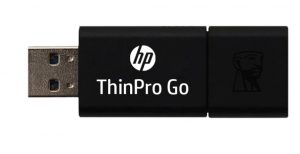HP Sees Accelerated Push for Enterprise Chromebooks, Thin ClientsHP Sees Accelerated Push for Enterprise Chromebooks, Thin Clients
HP broadens its Chromebook portfolio with three new systems and two thin clients.
May 5, 2020

HP will roll out new enterprise Chromebooks and thin clients including its first based on Intel’s Project Athena.
Among the five new enterprise Chromebooks and thin clients launched on Tuesday, two will ship this month. One of the two, the HP Chromebook 14G6 for frontline workers, is available now starting at $399. The three other systems will arrive this summer. They include the high-end Project Athena-based HP Elite c1030 Chromebook Enterprise.
HP has offered Chromebooks for more than a decade, but consumers and students are the usual targets. Similarly, HP has a long history of offering thin clients for traditional VDI deployments.
HP’s latest rollout of enterprise Chromebooks and thin clients cover a wide range of workers, usage scenarios and performance capabilities.

Technalysis’ Bob O’Donnell
“They’re diversifying the Chromebook line even more because they see a multitiered group of people using them,” said Bob O’Donnell. He’s the founder and principal analyst with TECHnalysis Research.
“The reality is Chromebooks were always best suited for organizations that primarily run SaaS or web applications,” O’Donnell said. “The problem was a lot of companies were very slow in doing that. Well, guess what? They’ve suddenly sped up all those efforts because of COVID. It’s not going to happen overnight, but there are a lot more companies who are starting to do more of that. And so Chromebooks all of a sudden become a more viable option in those environments.”
Keep up with the latest developments in how the channel is supporting partners and customers during the COVID-19 crisis. |
Before the COVID crisis, HP was already forecasting higher demand for enterprise Chromebooks and thin clients for mobile workers.
At the same time, many organizations were still reluctant to let firstline workers and other employees to work at home. After the pandemic suddenly shut down millions of offices and facilities two months ago, organizations have eased their stances.
As of mid-March, 72% of office employees were working at home, according to an HP survey. And 42% of IT managers have extended endpoint security and BYOD policies, according to the survey’s 1,100 respondents.
Chromebooks Rising
IDC last year forecast sales of Chromebooks to increase 61%.
During a media briefing, Andy Rhodes, HP’s global head of commercial systems, said demand is accelerating due to COVID-19. Rhodes said HP has shipped thousands of Chromebooks to companies that needed to suddenly equip their workers at home. While he declined to identify any customers, he said HP helped one major bank deploy 60,000 within weeks.

HP’s Andy Rhodes
“They shifted their strategy,” Rhodes said, in reference to the unnamed bank. “Business resilience is what it’s all about right now. And it’s going to continue to be we move forward.”
Demand for Chromebooks will accelerate even after the COVID crisis subsides, said John Solomon, VP of Google’s Chrome OS group. As organizations shift to web and SaaS apps, typically 20% of work requires OS-native software, according to Soloman.
“There’s important work that still needs to be done on legacy applications,” Solomon said during HP’s briefing. “Virtualization [of those legacy applications] works extremely well, particularly on these more performant Chromebooks that HP is bringing to market.”
All three Chromebooks come with Google’s Chrome Enterprise, upgraded last summer.
HP says its highest performing new Chromebook, the HP Elite c1030 Chromebook Enterprise, will ship in August. There’s no price yet, but it will be HP’s premium enterprise Chromebook. As noted, the HP Elite c1030 is the company’s first Chromebook based on Intel’s Project Athena. Intel revealed Project Athena last year, which brought social scientists into its design team. Instead of designing capabilities in its labs, the engineers conducted their work in actual work environments.
The HP Elite c1030 is powered with …
… Intel’s current 10th Gen Intel Core processors, 128/256 GB SSDs and up to 16 GB of RAM. It will also offer Wi-Fi-6 WLAN and optional 4GWWAN connectivity. The Elite c1030 is based on HP’s x360 form factor, allowing users to transition it from laptop, to tablet and tent modes.
The system builds on HP’s sustainability efforts and last year’s pledge to step up its efforts to use recycled materials. HP claims 75% of the Elite c1030’s top cover is made of recycled aluminum. And half of the system’s speakers and keyboard keys are made of recycled plastic. Overall, it weighs less than three pounds.
For more mainstream office use, the new HP Pro c640 Chromebook Enterprise will ship later this month. Designed for office work and collaboration, it has dual microphones, an 88-degree wide angle webcam and Wi-Fi 6 WLAN connectivity. The Chromebook is configurable with Intel 10th Generation Core i3, i5 or i7 processors up to 16 GB of RAM. The c640 is available with 32GB, 64GB or 128GB SSDs and an SD card slot. HP also emphasized its backlit keyboard that can withstand up to 12 ounces of spilled water. Built with an aluminum exterior, HP claims it is the thinnest 14-inch business Chromebook, measuring less than two-thirds of an inch at the hinge. It weighs 3.3 pounds. No price for this one yet either, but it will be available sometime next month.
The redesigned HP Chromebook Enterprise 14G6 doesn’t have the bells and whistles of the other two systems. But at a starting price of $399, frontline workers and those with modest requirements will find it most suitable. It is powered with Intel Celeron processors, with up to 8GB of RAM and up to 128 of storage. The system is available with touch and non-touch displays, and an optional backlit and spill-resistant keyboard. It also has the wide angle 88-degree webcam. Google’s Security H1 Chip and an optional HP privacy camera are included as well.
HP’s Thin Clients
HP’s two new thin clients include the mt22 Mobile Thin Client and HP ThinPro Go. The HP mt22 Mobile Thin client has a laptop form factor powered by Intel latest Celeron 5205U processor. It is configurable with Windows 10 IoT Enterprise or HP ThinPro, its Linux-based thin client OS. HP said it runs in Citrix and VMware VDI enterprises. The mt22 can also connect to services that support Windows 10 IoT including Windows Virtual Desktop (WVD), according to HP. HP said the mt22 will ship later this month, with pricing that starts at $495.

HP ThinProGo
The HP ThinPro Go is a USB stick that can convert any older system into a self-contained thin client. The company says older systems or employees at home who use their personal PCs for work will benefit most from the ThinPro Go.
“It just makes VDI easy for administrators and for users,” said Alex Thatcher, HP’s director of Chrome product management.
“You take it, plug it into your PC [and] you boot it up,” Thatcher added. “It checks your system, makes sure it’s compatible, and it launches right into our thin client interface. There is no software installed; the user doesn’t lose anything. IT doesn’t have the security risk of users using their personal machines. It’s a very powerful tool, especially right now. Sixty percent the users we surveyed say they are using their own personal PCs. Now, this is a fast, rapid way to make them secure devices.”
Slated to ship this summer, pricing for the HP ThinPro Go starts at $135.
About the Author
You May Also Like


